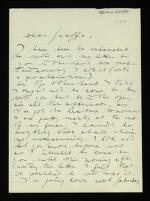A large archive of letters written weekly over a span of 42 years, with enclosures of Kreisel's own writings and that of others, including articles, interviews, and printed material as well as copies of letters from or to others (including Francis Crick), covering topics in mathematics and philosophy, and including reflections on Ludwig Wittgenstein, Kurt Gödel, and Bertrand Russell.
Faure, Hubert (1919-2020), Otis Elevator Company PresidentBelieves that nothing he says really interests Sraffa. Thinks that Sraffa likes to discuss things with him because he is persistent and clever, but their discussion lacks the enjoyment which is the oil that lubricates it.
Thinks that they have given each other all that they can; Wittgenstein has learnt an enormous amount from Sraffa but has learnt from him all that he can presently absorb.
Clarifies statements he made earlier about 'the changes of fashion' and the nature of taste; also elaborates on his discussion of 'the mentality of a people'. He ‘never said that the Austrians couldn’t be fascist because it was incompatible with their mentality’, but that he ‘could not immagine [sic] how this change could take place. The mistake I made was that I called fascism a kind of physiognomy & my difficulty was: how can the Austrians change into the face which I called fascism. The answer to this should have been: Fascism isn’t a face but a form of government etc etc, & though it is true that the face of Austrian fascism won’t be like the face of German & Italian fascisms still the form of government etc etc will be fascism’. Discusses predictions of the future using scientific and intuitive methods; example of weather forecasting.
Has written out his thoughts for Sraffa as promised; has to lecture tomorrow but physically very low; wishes to see Sraffa before he goes down.
'The error is to regard intuitions as a provisional substitute for science...'
Missed Sraffa on Sunday; sketched out some thoughts which he will write up when he can.
'This is likely to become a long letter for I feel there are many things which I should like, & perhaps ought, to say.' Thoughts arising from their conversation yesterday; it gives him a 'tragic feeling' when he sees 'how impossible it is to make myself understood by you'. Describes a 'certain kind of crookedness of my thoughts...' which he thinks prevents Sraffa from following him. Is very anxious not to lose 'the great benefit of your influence on my mind through some sort of obstinacy on my part'. The value of discussion and disagreement. Letter possibly incomplete: no signature.
In response to note from Wittgenstein, with criticism of Wittgenstein's method of discussion.
Good discussions between Wittgenstein and Sraffa would result only if Wittgenstein wrote things down in advance.
Asks Sraffa why he thinks the Austrians will not do most of the things that the Germans did. Wittgenstein does not know what there is to be learnt from events in Italy. Sraffa is not helpful in discussion.
Arrangements for dinner; wants to talk to Sraffa about vivisection.
Is glad to be able to inform Wittgenstein that the Council authorised a grant of £100 yesterday to enable Wittgenstein to carry on his research in Cambridge: half to be paid now and half at Michaelmas. The Council cannot feel committed to any further grants.
Trinity College Cambridge. - Heated discussion about national character; does not like clashing with people but would rather clash than be superficial; Smythies to read a paper to the Moral Sciences Club.
Postcard shows Queen's College Cambridge. 'I thought you might be interested to see my little house in Skjolden'.
Letter regarding [?] sending Wittgenstein's manuscript to Finland.
Valö, Inga, Finland. - Grateful that his stay in Cambridge was short as he has to 'clear his head'.
Helsinki. - Postal connections cut off since the German invasion of Denmark and Norway; life in Finland dominated by the menace from Russia; activities since the Finno-Russian War; stationed in the Carelian Woods and Marshes in September and October; regrets writing to Wittgenstein about his article in Mind; plans to write a paper on immediate knowledge; thinking hard about the logical nature of arithmetic; Beethoven's quartet in F major; reiterates his delight at having known Wittgenstein. Postscript on sending Wittgenstein's manuscript to Finland.
24 Idrottsgaten, Helsinki. - Explanation of a paper on randomness that he has written for Mind.
24 Idrottsgaten, Helsinki. - War in Finland; has not suffered from the air raids, cold, or lack of provisions; working as a military official; unable to give up time to new and important thoughts; if he has to die it will be with a happy mind; philosophical clarity is characteristic of a certain state of mind.
Valö, Inga, Finland. - Staying with family in Finland; surroundings unsuitable for his work; stayed at Trinity as the guest of Professor Broad; wishes to speak with Wittgenstein on the discussions he had in Cambridge; correspondence between language and reality; sense experiences; thanks him for his teaching; wishes to keep up correspondence with him.
27 St. John's Street, Oxford. - Has been ill for a month; would like to come to Cambridge to stay with Dr. Bevan.
27 St. John's Street, Oxford. - Ben Richards fell ill in Norway; decided he wants to return to Norway to work.
27 St. John's Street, Oxford. - Did not travel to Norway; [Ben] Richards failed his exam]; Wittgenstein's ability to do philosophical work has vanished; sorry to hear about von Wright's accident; found Toynbee 'very stupid'.
Royal Victoria Infirmary, Newcastle-upon-Tyne. - Still doing 'old work'; feeling lonely and would like to move to Swansea.
Postcards from Vienna: 'These cards will show you the characteristics of the Barock'. Cannot come to London on 9th as his nephew is getting married, will come on 11th instead, hopes to visit cinema.
